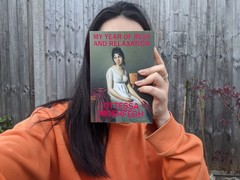We're discussing a new chapter each week. Read along with us and submit your thoughts to coronabookclub@vice.com.
a) As the narrator is about to embark on her four month-long sleep, she invokes the language of ritual. “Something had to be burned and sacrificed. And then the fire would burn out and die.” Why does she talk about it in this way?
Lauren O’Neill: What the narrator is doing is very ritualistic – in its specifically regulated nature, and the fact that it will hopefully achieve some type of enlightenment. It also gives what she is about to do a level of resonance that I think she needs in order to go through with it; just before she mythologises it in the language of ritual, she is talking about how “preposterous” it is. All ritual is preposterous really, but it’s the ritual-ness of it that makes you believe in it.Eleri Riglar (via email): The narrator is seeking a spiritual renewal from the four-month sleep. She is looking for a transcendental experience from the Infermiterol, which means that set and setting are of paramount importance. She works on the setting by getting rid of virtually all of her worldly possessions (this also helps the set by ensuring that there will be nothing to distract her while the project is happening). Talking about the process in a ritualistic, quasi-religious manner is a way of helping her to get into the right mindset with a blank mind and focus on what she’s trying to achieve. The idea of sacrifice and "something" burning and dying reinforces the notion of the sleep as a purifying, healing force.b) Ping Xi wants the narrator to burn her identity documents on camera. In response, she says, “I was born into privilege, I’m not going to squander that […] I’m not a moron.” How does the novel present the privilege of its narrator?
Eleri: The narrator’s privilege is presented in quite a matter-of-fact way. It’s quite clear that she takes the trappings of luxury for granted. Her isolation and disaffection with the outside world seem quite in-keeping with the concept of affluenza. The narrator’s privilege in terms of wealth and beauty throws into sharper relief the things she is missing and has missed out on in life, such as nurturing parents and the ability to relate to other people. On the other hand, her privilege is essential for our suspension of disbelief, since no ordinary person would have the ability to just opt out of society in the way the narrator does.Hannah Ewens: I loved this little line – she recognises her privilege as her detractors or a reader might. She’s very aware that her trauma would be magnified and lead to endless suffering had she been born working class or poor. I wish more people in real life were as knowing and forthcoming with their inherited wealth!c) How does the tone change when the narrator has woken up? Has she changed?
HE: She has lost so much of her hardness. The tone is clear, empty, matter-of-fact, as if she’s in a fresh daze. You can hardly believe this cleansed vessel was the former woman who had just hunted through her bulimic friend’s apartment, saying aloud that she hated her more than ever. Against all odds – certainly my ideas of what her experiment would mean – sleeping seems to have subtly cured her.Her brand new observations come through most vividly when she meets Reva for the final time. The narrator has found Reva relentlessly dull in her thoughts and inner life, whereas now she is witnessed as a three-dimensional person: someone with a soul, a spirit of her own. Or as the narrator puts it: “with all her nerves and all her complicated, circuitous feelings and contradictions and fears.” There’s intimacy there, in “the vague dimple in her left cheek, the moon-shaped sadness of her eyes,” that must have been there all along for the narrator, just deeply buried.LO: The thing that struck me was the amount of time that the narrator seems to want to spend outside, while before she avoided doing anything other than walking to the bodega or to collect her prescriptions. Though she is not necessarily ready to rejoin society in the sense of forming relationships – other than her attempts to see Reva again – it’s nice to see her being among nature, and working her way back to existing in the world from the ground up. The language that she narrates in after she wakes up is deliberate and clear, like her vision is uncluttered: “I had no dreams. I was like a newborn animal. I rose with the sun.”Eleri: The most important way that the narrator has changed is in her attitude to the house and her parents. She is now ready to let go of the house and sees the idea of a new family making new memories there as something "beautiful", rather than something at odds with her keeping her own memories. She doesn’t even want to know about any of the things in the attic – last time the house sale was discussed, this was used as a bit of a stalling tactic as she still wasn’t ready to let go. This change, more than any other, suggests that the four-month sleep has achieved its purpose.d) The narrator asks artist Ping Xi to help with her experiment, and art is referenced a number of times in the chapter. What does art mean to the narrator?
LO: I really think that in every sense, art is what has saved this woman. It’s the only thing she properly believes in – at one point, she even called it “sacred” – and it’s art that has, on a practical level, given her the tools to go through her rebirth. It’s interesting that she describes herself as being discussed in publications like Artforum, when she has expressed a past desire to be an artist herself (though she does also critique the art world, of which these publications are a part, in many of its different guises). Her experiment, in a small and roundabout way, has given her what she has always wanted.HE: Bloody Ping Xi. I’m glad he found a worthy purpose in the end. He thought the art was in his crap woodblock prints. In fact, he was merely facilitating the experimental art, as created by the narrator, the muse and artist. It’s interesting that Xi surrounded her with Chanel and Coca-Cola and Absolut Vodka in the images, when the narrator had purposefully shed herself of all of those material things. Perhaps he did understand the narrator’s project. But in his translation he missed its spiritual purpose.When she walks around the gallery at some point after going to Ping Xi’s show, we see her manifesto for “true” art. She has a real, genuine appreciation for the art itself, an object completely removed from the artist’s ego. She imagines the painters of the pieces she sees wondering what she thinks of them, of their worthiness. So, she may have not told us that she thinks Ping Xi’s work about her experiment was crap but we know her thoughts on Ping Xi's art in general from earlier in the book. We know how much she cherishes art and imbues it with almost spiritual importance. It has to move you, as a viewer.e) The final chapter is about the event we knew was coming: September 11th 2001. How do you feel about the end of the novel?
Eleri: By this point, it shouldn’t be surprising that the narrator has an ~unusual way of processing the new trauma of 9/11. We see a new manifestation of her old behaviour in the way she watches and rewatches the news coverage. Given how horrible we know this footage to be, there are hints of her previous self-centred attitude. She uses it as a kind of motivational video, detached from the reality of what happened. It’s like she is seeing it as an art piece, rather than a depiction of real events.The final sentence of the novel reinforces this idea of life as art, as the narrator describes the composition of the scene of a Reva-like woman leaping from the Tower. It also feels like an implicit rebuke of the narrator’s previous escapist attitude to life due to the use of the phrase “wide awake”. The feeling I get from the end of the novel is that we should all metaphorically be like this woman, tackling life and our problems head on.LO: I think that the end of the novel is really beautiful. It’s obviously also extremely sad. It made me realise that as much as this novel is about the narrator, it’s also about Reva (easily the most sympathetic character) and all of the societal pressures she, more than anyone else in the story, symbolises and internalises. In choosing to jump from the Towers, the figure that the narrator believes to be Reva exercises a type of agency that the systems that kept her in place throughout her life – and which are implicitly critiqued throughout the novel – would never have allowed her to. For the narrator, it’s the most alive she has ever seen Reva, and it serves as a reminder to her throughout her life at times when she “doubt[s] that life is worth living.” In that way, as always, Reva is helping the narrator realise things about herself, but I think that after the narrator wakes up from her sleep – and even before Reva dies – she has a new respect for her friend.HE: I found the ending enormously moving. I knew that it was coming and guessed we’d get some kind of scene where the narrator watches the event happen on TV, considering all the TV she watches. The fact that Reva is gone but Trevor lives is the first emotional gut-punch. But I felt completely blindsided by the image of a woman jumping from the building and the final line: “There she is, a human being, diving into the unknown, and she is wide awake.” I just read that final chapter back – it’s only a page, which is a perfect length for its poignancy – and it made me cry the second time too. It feels devastating as a reader to learn that it took both losing Reva and watching a terrorist attack to bring the narrator back to life. It was loss that drew the narrator into sleep, and loss that has made life worth being conscious for.I felt a light undercurrent of repulsion when reading it the first time though, and about the fact that the narrator is using re-watching a horrific event to process her own trauma. It’s not that I judged the narrator for being typically self-centred, but more the way that we as humans wait for huge global or local tragedies to make us appreciative of life. I also realised the importance of the book being set prior to social media – before we were somewhat desensitised by the news cycle. She couldn’t just log on and Google videos of the attack. The narrator had to record the attack on her VCR, giving the image, the film, some holy quality. This video, according to her thesis of art, sort of shows how real life is art in itself, but far, far more powerful.@hiyalauren / @hannahrosewensSign up to our newsletter to get the best of VICE UK delivered to your inbox every week.

